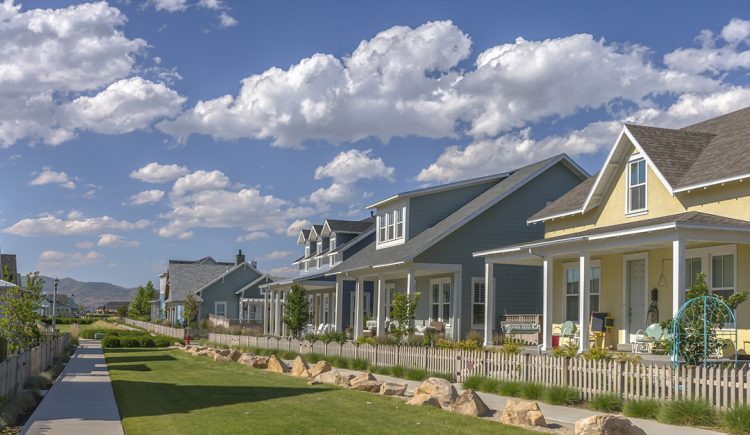(TNS)—Before the coronavirus recession, Utah’s housing market was on fire. Then came the COVID-19 pandemic, which sent residents of Northern California and Seattle in search of affordable homes and more space, and an already-hot market grew hotter.
Dave Robison, past president of the Utah Association of REALTORS®, sums up the activity simply. “It’s insane,” says Robison, a real estate broker in Salt Lake City.
His assessment isn’t just salesmanship. Utah home prices have been soaring as Californians stream into the state. Utah boasts the nation’s strongest pace of job growth, along with rock-bottom unemployment, ultra-low mortgage rates, few mortgage delinquencies and low state and local taxes.
All those factors pushed Utah into first place in Bankrate’s Housing Heat Index in 2020, a spot it continues to hold for the first quarter of 2021. Residential real estate has boomed during the coronavirus recession, and Utah has emerged as a particularly desirable market.
Other states in the region also are thriving. South Dakota, Montana and Idaho rank second, third and fifth, respectively, in Bankrate’s index.
At the opposite end of the list is Hawaii, a state that has been hit hard by the COVID-19 pandemic. Its tourism industry is slowly recovering from a near standstill, and Hawaii’s jobs picture remains dark.
The 5 States With the Hottest Housing Economies
The Housing Heat Index shows how states’ real estate markets are faring in the coronavirus-fueled housing boom, and how they might perform in the future.
To calculate the ranking, Bankrate analyzed six data points: annual home price appreciation reported by the Federal Housing Finance Agency’s Home Price Index; share of mortgages past due as reported by the Mortgage Bankers Association; unemployment and job growth from the U.S. Labor Department; the cost of living index from the Center for Regional Economic Competitiveness; and state-by-state tax burdens as reported by the Tax Foundation
These five states had the strongest housing economies in the first quarter of 2021:
1. Utah. Its home values jumped 19% in the 12-month period that ended March 31, second-best among U.S. states, according to the Federal Housing Finance Agency. Utah posted the second-strongest job growth in the nation from March 2020 to March 2021, according to a Bankrate analysis of Labor Department data. What’s more, Utah had the nation’s lowest unemployment rate, and its tax burden is among the lowest in the nation, according to the Tax Foundation.
2. South Dakota. Home prices soared nearly 15%, and South Dakota tied with Utah for the lowest unemployment rate in the nation.
3. Montana. Home prices rose 15% in the past year, and Montana has the nation’s lowest level of past-due mortgage payments, according to the Mortgage Bankers Association.
4. New Hampshire. The geographic oddity in our ranking, New Hampshire saw home values jump 16%, and the unemployment rate and tax burden are low.
5. Idaho. Idaho’s home prices have been the hottest in the nation, soaring 23.7% in the year ending March 31. And job growth is the strongest in the country. However, Idaho’s overall ranking was tempered by middle-of-the pack readings for cost of living and taxes, and a back-of-the-pack ranking in mortgage delinquencies.
Homebuyers Seek Affordability, Space
The prominent rankings of states in the Mountain time zone illustrate a shift in the housing market: Americans are still drawn to healthy labor markets, but even before the coronavirus pandemic, they were growing less willing to pay up to live in places like San Jose, Seattle and Boston.
COVID-19 has pushed many—especially those who can work remotely—to leave the priciest areas for more affordable regions.
“We are seeing the makings of a renewed affordability migration,” says Mark Vitner, senior economist at Wells Fargo. “The beneficiaries of that shift have largely been the midsized metros in the mountain states of the West.”
The median price of a single-family home sold in Silicon Valley during the first quarter was a staggering $1.5 million, according to the National Association of REALTORS®.
The typical price in Salt Lake City was $435,400—above the national median, but not dramatically so, and just a fraction of the price paid by residents of Northern California.
The price gap has spurred many in high-cost markets to consider moving. The notion is especially appealing to workers who can take their high-wage jobs to areas with lower costs of living.
“People suddenly have the ability to choose where they live because they’re not tethered to an office,” says Alicia Holdaway, an agent at Summit Sotheby’s International Realty in Draper, Utah, and past president of the Salt Lake City Board of REALTORS®. “We’ve had a net in-migration that’s been happening for years, and that’s only increased.”
Every boom brings its disadvantages, of course. In some cases, new arrivals to Utah’s housing market are flush with cash and willing to bid up prices.
“There’s always a flip side,” Holdaway says. “We’ve been seeing housing affordability become a crisis.”
The 5 States With the Coolest Housing Economies
As a nationwide housing boom rages, every state saw property values increase during the 12 months that ended in March. However, some state economies are struggling with weak job growth and other challenges. The bottom 5 on our index:
47. Illinois. High unemployment and tepid price appreciation placed Illinois near the bottom of the pack.
48. New York. Hit hard by the pandemic, New York is facing a number of headwinds. It ranks near the bottom in job growth, unemployment, tax burden and past-due loans.
49. Washington, D.C. The district ranked near the bottom in home price appreciation. The city also ranked last in cost of living, and near the bottom in unemployment in tax burden.
50. Louisiana. It ranks worst in past-due loans, with more than 9% of homeowners behind on their mortgage payments. Louisiana also fares poorly on price appreciation, job growth and tax burden.
51. Hawaii. This tourism-dependent state ranks dead last in job growth and unemployment and near the bottom in price appreciation.
“The overall picture is one of a very weak economy,” says Carl Bonham, executive director of the University of Hawaii Economic Research Organization.
Methodology
To calculate the Housing Heat Index for the first quarter of 2021, Bankrate analyzed six data points:
– Annual home price appreciation for the first quarter as reported by the Federal Housing Finance Agency’s Home Price Index
– Share of mortgages past due for the first quarter as reported by the Mortgage Bankers Association
– Unemployment rate for March from the U.S. Labor Department
– Annual job growth as of March from the U.S. Labor Department
– The cost of living index for 2020 from the Center for Regional Economic Competitiveness
– State-by-state tax burdens for the 2020-21 fiscal year as reported by the Tax Foundation
The index overweights home price appreciation, the metric that most clearly conveys a housing market’s desirability. And the index underweights cost of living and tax burden—home prices can soar despite those factors, but a new wave of remote work makes those factors more relevant than they were in the past.
©2021 Bankrate.com
Distributed by Tribune Content Agency, LLC











